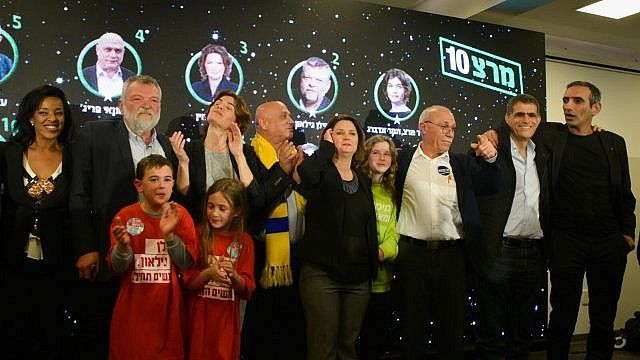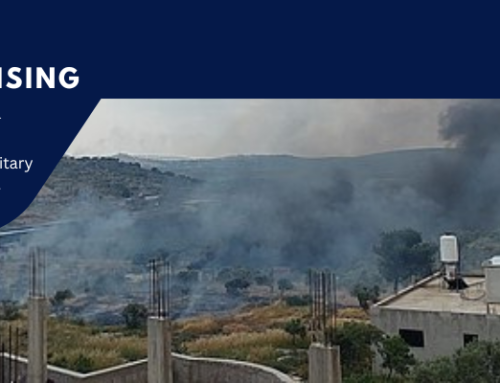Return to Israel Horizons main page
At first glance, Israel’s April 9, 2019 Knesset elections seemed to produce little change from the standpoint of Meretz, the party apparently ending the 2019 campaign with four seats (barely missing a fifth). True, that’s a drop of one compared to the five it had in the outgoing Knesset, but its losses were trivial compared to the Labor Party’s catastrophic 18-seat freefall, which came amid the mass migration of center-left voters to former Chief of Staff Benny Gantz’s new Blue and White party (Israel’s latest centrist flavor of the month).
What’s more, just like last time, Meretz is headed for the opposition benches, where it will do all it can to minimize the ravages of what is shaping up to be another right-wing/religious/Haredi government led by Binyamin Netanyahu. And the faces won’t be new, either: Meretz’s four incoming Knesset members are all incumbents – Tamar Zandberg, Ilan Gilon, Michal Rozin, and Esawi Freige – back to serve an additional term.
But probe a little deeper, and one can see that the results of this election could be the harbinger of some dramatic shifts, especially with regard to the still-taboo possibility of sweeping Jewish-Arab integration in Israeli politics.
Party leader Zandberg hinted at the possible new direction when she addressed Meretz activists on election night, following the publication of the exit polls: “The future of the Israeli left,” she said, “is Jewish-Arab partnership … Unless Israeli politics treats all the country’s citizens equally, there’s no future.” Days later, as the dust settled, Zandberg elaborated on the message, writing in an e-blast to supporters that a “new Israeli left … must include true Jewish-Arab partnership – social, civil, and political” [emphasis added]. Soon after that, she was even more explicit, indicating that Meretz was open to a leftist merger that “would need to include Labor, Meretz, and a significant Arab [political] force, such as the [overwhelmingly Arab] Hadash party, or part of it.”
Suggesting that this was not just a theoretical possibility, Zandberg stressed that, “we need to start doing this now.” She noted that Israel can have snap elections at any time and because of that, “the time is right” for forging such a merger.
The initial reaction from Hadash has been less than enthusiastic. Speaking on behalf of his party colleagues, MK Yousef Jabareen stated that Hadash is “not considering any merger with Meretz,” and that his party plans to be the “leading and largest party among the Arab public.”
Labor, too, has its reservations. While senior Labor MK Shelly Yachimovich floated the possibility of a Labor-Meretz merger on Facebook, she stressed that the parties’ common denominators were their “left-Zionis[m]” and “patrioti[sm],” and made no mention of including any non-Zionist entity such as Hadash. Alternatively, Yachimovich put forward the idea of Labor merging with Blue and White. Other Labor figures have expressed greater caution, warning that even a merger limited to Labor and Meretz could drive away Labor’s “sizable hawkish wing.” Certainly a merger involving a major Arab faction would jettison that wing altogether.
But the time for caution on the Israeli left might be nearing an end. In the past, a traditional argument in favor of Meretz and Hadash running separately was that a joint run could alienate some voters in each party – due to both ‘tribal’ (i.e. identity politics) and ideological considerations. Some Hadash voters, so goes the argument, would be put off by Meretz’s primarily Jewish identity and its associations with Zionism. Some Meretz voters, meanwhile, would object to Hadash’s non-Zionism and be scared off by cooperation with a party that is increasingly being portrayed by rightists as a fifth column and is regarded even by many centrist Israelis as beyond the pale.
A growing number of voices in and around Meretz, however, seem to believe that it’s time to discard the caution of the past. With Israel’s Jewish population now skewing overwhelmingly to the right (polls indicate that just over half of Jewish Israelis now define themselves as right-wing, compared to 15 percent who consider themselves to be on the left), the simple electoral math is that Israel’s center/left has little to no chance of unseating the Likud if it continues to keep Israel’s Arab citizens – 20 percent of its population – at arm’s length and defines the parties that represent them as unfit for participation in a governing coalition (as both Blue and White and Labor did explicitly during the recent campaign).
Beyond electoral considerations is the sense that Israel has reached a tipping point that is making the old norms antiquated. Last year’s Nationality Law, for example, gave unprecedented constitutional preference to Israel’s Jewish population over its Arab one, while pointedly omitting any guarantee of equality for all citizens. And the rhetoric of Netanyahu’s Likud and its allies has become increasingly bellicose in its delegitimization of parties that draw the bulk of their votes from the Arab sector. Keeping the Jewish and Arab left apart – even if due only to tactical considerations – serves to reinforce that pernicious message. On top of that, the distinct possibility that Israel will begin to annex the West Bank – as Netanyahu pledged during the campaign – has increased the likelihood of a one-state future, however that would be configured.
A significant leftwing Jewish-Arab, Zionist/non-Zionist partnership would obviously cause some discomfort on both sides. But Meretz’s platform seems to provide a foundation for potential collaboration, since it can be read as Zionist and non-Zionist at one and the same time. “The State of Israel,” the platform’s opening sentence reads, “is a democracy, the state of the Jewish people/nation (“am Yehudi”) and of all its citizens.” But Meretz does more than proclaim the equal rights of Arab citizens – it calls for the recognition of “the Arab minority as a national minority with collective rights” that should be able to “express its unique culture, and to operate in its language while maintaining its status as an official language.” Might the Jewish and Arab left be able to unite around such a vision?
Meretz’s list of candidates and the results of the recent election are further indications that change is coming. For the first time ever, two of the first five candidates on the party’s electoral list were Arab – incumbent MK Esawi Freige and Druze educator Ali Shalalha. Perhaps not coincidentally, Meretz tripled its vote totals among Israel’s Arab citizens – securing 35,000 votes in Arab towns and villages compared to 12,000 in 2015. At the same time, the party saw its Jewish vote decline around 20 percent, from about 150,000 last time to roughly 120,000 in this year’s elections. In other words, Meretz would probably not be in the Knesset except for those Arab voters, who were presumably encouraged by the party’s increasing openness (and possibly disappointed by the record of the Joint List politicians during the last Knesset).
Meanwhile, while Meretz performed relatively well in its largely Ashkenazi central-Israel strongholds (Tel Aviv, at 8.98%, and its satellite cities), it again failed to generate much support in the country’s largely Mizrachi outlying “development” towns, such as Sderot (0.87%), Dimona (0.36%), and Kiryat Shemona (0.72%); or in less affluent mid-sized Jewish cities such as Ashdod (0.52%), Ashkelon (0.66%), or Beersheba (1.27%). After repeated election cycles in which Meretz has sought to win over those voters on the basis of its admirable social justice record – only to be rebuffed due to the party’s image as “part of the Ashkenazi elite” as well as “too soft” on the Palestinians – it now appears that Meretz’s true “growth market” is in the Arab sector, a factor which will certainly be part of its political calculus moving forward.
Clearly Israel’s political map is shifting fundamentally and, if Meretz wants its ideals and policies to be represented in the Knesset after this one, it has some significant decisions to make in the near future.

Ron Skolnik is an American-Israeli political columnist and public speaker, whose articles have appeared in a variety of publications, including Haaretz, Al-Monitor, Tikkun, and the Palestine-Israel Journal. He is a past Executive Director of Partners for Progressive Israel..





Ron, An interesting analysis. However, as I have tried to stress in many different ways, Hadash is simply not interested in an alliance with Meretz. It sees itself primarily as an Arab party. Over 95% of its voters are Palestinian-Israelis, and they are only interested in partnering with Meretz on specific issues, not in an electoral bloc. At this stage, Labor as it’s currently constituted, with Avi Gabbay still as the leader, is also not interested in basing its strategy on Jewish-Arab cooperation. That leaves Meretz as the only factor seriously developing a Jewish-Arab political partnership. Maybe after Labor has it’s leadership election in 6 months, things may change, and they may then be ready for a new version of a Labor-Mapam Alignment, in the form of a Labor-Meretz Alignment.
Thanks, Hillel. Yes, I did note in the article Hadash’s rather dyspeptic reaction and I agree it won’t be easy. And it might not actually happen before the next elections either, of course. On the other hand – I think that if Meretz leads on the issue of Jewish-Arab partnership and remains consistent (and sincere) in this message, it could have an effect over time. And if Meretz does run alone again, it might have no choice electorally but to pursue votes in the Arab community even more vigorously – due to possible additional Jewish vote depletion. I also see no way for the Left to present a counter-vision to that of the Right that doesn’t involve making entitlement/belonging a function of Israeli citizenship, as opposed to Jewish ethno-religiosity (sorry for the double negative!). As I note, I actually think Meretz’s platform goes a long way towards forging such a counter-vision.
I’m actually a bit concerned about a Labor-Meretz alignment, because such an arrangement would reassure both parties that they’d clear the threshold together next time and this might make them less inclined to break with the norms of the past and offer a more compelling vision.
Thank you for the interesting Analysis. Is there maybe a Website, or something like that, which describes the “local” election Results even further?